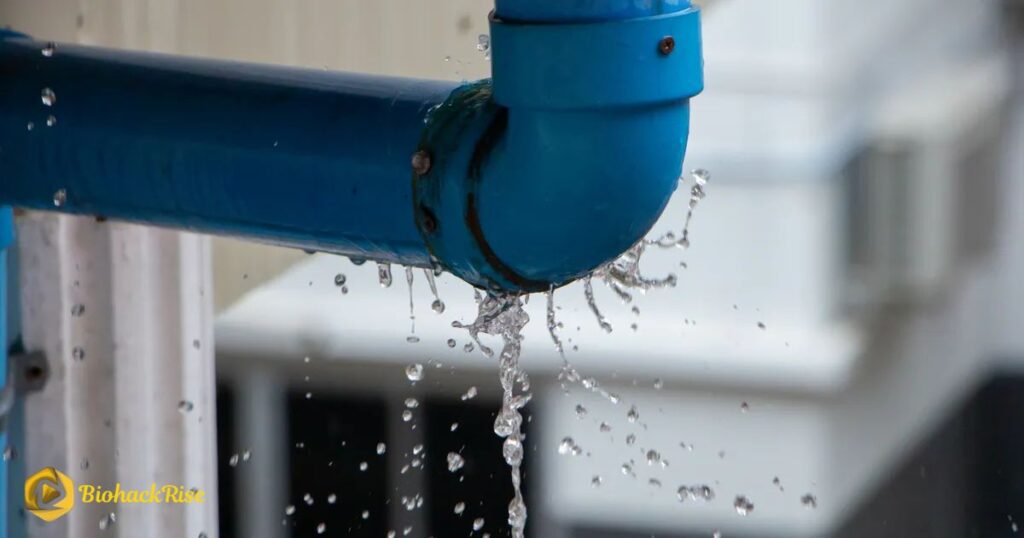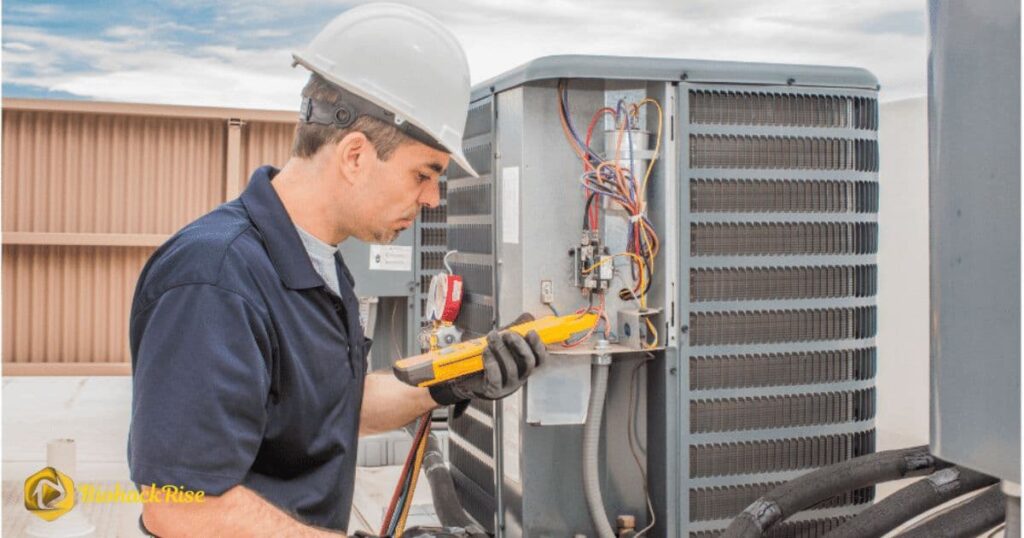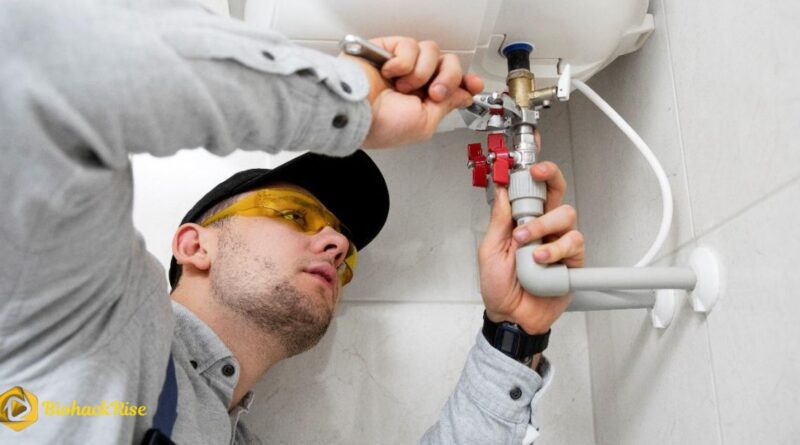Tapping Air: Understanding and Fixing Air in Your Plumbing System
When you turn on the tap and hear a knocking, gurgling or tapping sound, it often means one thing, air trapped in your plumbing system. Known as tapping air or an airlock, this issue is not just annoying but can also disrupt water flow, damage your plumbing and lead to costly repairs if ignored.
In this guide, we’ll take a deep dive into what tapping air is, why it happens, how to identify it and the best ways to fix it, whether you’re a DIY enthusiast or considering calling a professional plumber.
What is Tapping Air in Plumbing Systems?
Tapping air refers to air bubbles trapped inside your plumbing system. Instead of water flowing smoothly, pockets of air create pressure differences, leading to strange sounds and interrupted water flow.
Imagine sipping a drink through a straw. If you get air pockets while sucking up liquid, you’ll hear that slurping sound. That’s exactly what happens inside your pipes when air gets trapped, only louder and sometimes more damaging.
This problem is extremely common in both residential and commercial plumbing. While a little air isn’t dangerous, consistent tapping, gurgling, or reduced water pressure should not be ignored.
Common Causes of Air in Pipes
Air can enter your plumbing system in multiple ways. Understanding these causes is the first step in preventing and fixing the problem.
- Repairs and Maintenance Work
Whenever plumbing work is done, whether replacing a faucet, fixing leaks or upgrading pipes, air often sneaks into the system.
- Water Supply Interruptions
If your main water supply was shut off or there was a sudden water outage, chances are your pipes are now holding air.
- Leaks in the Plumbing
Small leaks don’t just waste water, they also let air in. This combination can worsen the tapping air problem.
- Faulty Pump Systems
For homes using well pumps, a malfunctioning pump can introduce air into the water line, causing constant knocking or sputtering taps.
- Natural Water Flow
In some cases, high water turbulence creates bubbles in pipes, especially in older or poorly designed plumbing systems.
Signs and Symptoms of Tapping Air
You don’t need to be a plumber to detect trapped air. The signs are pretty obvious once you know what to look for:
- Knocking or Banging Sounds – The most common symptom, especially when turning on taps.
- Sputtering Faucets – Water flow is irregular, often starting with bursts of air before water stabilizes.
- Low Water Pressure – Airlocks restrict water flow, reducing pressure in showers and faucets.
- Gurgling Drains – Trapped air in drainage lines creates bubbling sounds when water flows.
- Uneven Water Flow – Sometimes water will stop mid-flow due to air pockets blocking the path.
If left unchecked, these symptoms may escalate into damaged pipes, pump strain or higher water bills.
How to Fix Tapping Air: DIY Solutions
Good news: many cases of tapping air can be fixed without professional help. Below are the most common DIY methods to bleed air from your pipes.
a. Run All Faucets
- Turn off the main supply.
- Open all faucets in your home—from top floor to bottom.
- Turn the main supply back on slowly.
- Let water run until it flows smoothly with no sputtering.
These forces air out through open faucets.
b. Use Garden Hose Method (For Airlocks)
- Connect a hose between a working tap and the problematic tap.
- Open both taps, allowing water pressure to push air out.
- After a few minutes, disconnect and check if the airlock is cleared.
c. Check Pump Systems
If you rely on a well pump, bleeding the pump lines or checking pressure settings can often solve the issue.
d. Bleed Radiators (For Heating Systems)
In heating systems, tapping air may also be caused by trapped air in radiators. Use a bleed key to release it safely.
When to Call a Professional Plumber
While DIY fixes work in most cases, there are times when you should call in the experts:
- Persistent airlocks despite multiple attempts to clear them.
- Visible leaks in pipes or joints.
- Reduced water pressure throughout the entire property.
- Strange smells, discoloration, or contaminated water.
- If you rely on a well water system, and the problem keeps recurring.
Professional plumbers have the tools (like air compressors and pipe inspection cameras) to diagnose and fix deeper issues you can’t see.
If you are interested also read our latest article regarding Gene Hackman Estate Will. Hope you will like it.
Dangers of Ignoring Tapping Air
It’s tempting to shrug off the occasional banging noise in your pipes, but ignoring tapping air can lead to bigger headaches. Let’s look at why this seemingly minor problem deserves your attention.
· Increased Wear and Tear on Pipes
Every time trapped air causes water to hammer against the pipe walls, it stresses the plumbing. Over time, this weakens joints, fittings, and even metal pipes. What starts as a harmless noise may end up in burst pipes or expensive replacements.
· Reduced Efficiency in Appliances
Air in your plumbing doesn’t just affect faucets. Appliances like washing machines, dishwashers and water heaters depend on steady water flow. Airlocks can make them run inefficiently, use more energy and shorten their lifespan.
· Risk of Water Contamination

In rare cases, leaks that allow air into pipes can also let contaminants in. That means your drinking water may be at risk of bacteria or other impurities entering through tiny cracks.
· Strain on Pumps and Heating Systems
If you rely on a water pump or a central heating system, trapped air can make these systems overwork, leading to breakdowns and costly repairs.
Think of it this way: ignoring tapping air is like ignoring a small rattle in your car’s engine. It may still run for a while, but eventually, that small problem snowballs into something you’ll wish you fixed sooner.
Preventive Measures: How to Stop Air from Entering Pipes
The best fix is prevention. By taking a few proactive steps, you can greatly reduce the chances of air creeping into your plumbing.
a. Regular Plumbing Maintenanc
Schedule annual plumbing inspections. A licensed plumber can spot leaks, weak joints and faulty valves before they become serious.
b. Proper Pump Settings
If you have a well pump, make sure it’s correctly calibrated. Too much suction can pull air into the lines. Regular servicing keeps everything in balance.
c. Avoid Frequent Water Shut-Offs
Constantly turning the water supply on and off increases the chance of airlocks. If you need to shut it off, always reopen slowly to avoid pressure imbalances.
d. Upgrade Old Plumbing
Older homes with outdated plumbing are more prone to airlocks and tapping air. Upgrading to modern piping and pressure regulators can make a huge difference.
e. Insulate Pipes
In colder regions, air and pressure problems often come from freezing pipes. Insulating them not only prevents freezing but also helps maintain steady water flow.
Tapping Air vs. Water Hammer: Know the Difference
Many homeowners confuse tapping air with water hammer—two common but different plumbing issues. Here’s how to tell them apart.
| Feature | Tapping Air | Water Hammer |
| Cause | Air trapped in pipes | Sudden pressure surge when water stops abruptly |
| Sound | Sputtering, gurgling, or light knocking | Loud bang or thud (like a hammer strike) |
| Water Flow | Uneven, sputters before stabilizing | Water flows normally after the noise |
| Fix | Bleeding air from pipes | Installing water hammer arrestors or pressure regulators |
While both create annoying noises, water hammer is usually more damaging and requires hardware fixes, whereas tapping air is solved by releasing trapped air.
Tools and Equipment That Can Help
For DIY enthusiasts, having the right tools makes fixing tapping air much easier. Here are a few you might want to keep on hand:
- Pipe Wrench – Useful for tightening joints that may be leaking air.
- Hose Connector – Essential for the garden hose method of clearing airlocks.
- Radiator Key – If your heating system has radiators, this tool helps bleed air out safely.
- Pipe Insulation – Prevents air-related issues caused by freezing temperatures.
- Water Pressure Gauge – Helps monitor pressure fluctuations that might allow air into pipes.
Even if you don’t plan to fix things yourself, owning these tools can help you understand what’s happening and assist plumbers when they arrive.
Cost of Fixing Tapping Air
The cost of solving tapping air varies depending on the severity of the issue and whether you hire a plumber.
- DIY Cost
Most DIY fixes (like running faucets or using a hose) cost next to nothing. At most, you’ll spend a few dollars on basic tools.
- Professional Plumber Cost
If the problem is deeper, a plumber may charge anywhere between $100 to $300, depending on the region and complexity. For well pump systems or major leaks, costs can go higher.
- Long-Term Savings
Fixing tapping air early prevents expensive repairs later. A burst pipe from neglect can cost thousands in damages, so a quick fix now is an investment in future peace of mind.
Tapping Air in Heating Systems

While most people associate tapping air with plumbing pipes, heating systems often suffer from the same issue. Trapped air in radiators, boilers or central heating loops can cause uneven heating, annoying noises and higher energy bills.
Signs of Air in Heating Systems
- Radiators warm only at the bottom, staying cold at the top.
- Gurgling or bubbling noises when the system runs.
- Reduced efficiency in heating your home.
- Frequent pressure drops in the boiler gauge.
How to Fix It?
- Bleed Radiators: Use a radiator key to release air until water flows steadily.
- Check Boiler Pressure: Repressurize your system if air release causes pressure loss.
- Call a technician: If air keeps returning, it could indicate a pump issue or system imbalance.
Heating systems are particularly vulnerable to airlocks, and ignoring them can lead to uneven heating or even boiler breakdowns.
Environmental Impact of Airlocks
Believe it or not, tapping air doesn’t just hurt your home, it can also affect the environment.
Wasted Water
Airlocks cause sputtering taps that waste water every time you turn them on. Over months, this adds up to gallons of unnecessary water loss.
Increased Energy Use
Appliances and heating systems forced to work harder because of air in pipes use more electricity or gas. That means a higher carbon footprint.
Risk of Contamination
Leaks letting air into pipes can also let contaminants in. That means higher demand for water treatment, which further strains environmental resources.
By fixing tapping air quickly, you’re not just protecting your home—you’re also making a greener choice.
Myths About Tapping Air
There are plenty of misconceptions about tapping air that confuse homeowners. Let’s bust a few:
Myth 1: It’s harmless.
False. Airlocks can damage pipes, pumps and appliances if ignored.
Myth 2: It only happens in old homes.
Wrong. Even new plumbing systems can trap air after maintenance or water shut-offs.
Myth 3: It always needs a plumber.
Not true. Many airlock issues can be fixed with simple DIY steps like running faucets or using a hose.
Myth 4: It’s the same as water hammer.
Incorrect. They may sound similar, but tapping air and water hammer are different problems with different solutions.
Expert Tips to Handle Tapping Air Like a Pro
Want to avoid unnecessary stress and costly repairs? Follow these expert tips:
- Always open water valves slowly after shut-offs to avoid trapping air.
- Run faucets in sequence (top to bottom of your home) whenever you suspect air in the system.
- Check pump systems regularly if you rely on well water.
- Install air release valves in heating systems to automatically vent trapped air.
- Monitor water pressure—sudden drops may mean leaks that are letting air inside.
These little habits go a long way in preventing recurring tapping air problems.
FAQ’s
How do I know if my pipes have trapped air?
If your faucets sputter, make knocking sounds, or show uneven water flow, chances are you have trapped air.
Can air in pipes damage plumbing?
Yes. Over time, trapped air can stress joints, weaken pipes, and reduce appliance efficiency.
Is tapping air the same as water hammer?
No. Water hammer is a pressure surge that causes loud bangs, while tapping air is caused by trapped air bubbles.
How do I prevent airlocks?
Avoid frequent shut-offs, maintain your plumbing, and install air release valves where necessary.
Do I always need a plumber for tapping air?
Not always. Many airlocks can be fixed with DIY steps. But if the problem persists, professional help is best.
Conclusion
Tapping air may start as a harmless knocking noise in your pipes, but it should never be ignored. Whether it’s a result of plumbing repairs, water shut-offs, or hidden leaks, trapped air affects water flow, stresses your plumbing, and can even impact your health and the environment.
The good news? Most airlock issues are easy to fix yourself with methods like running faucets or using a garden hose. But for persistent problems, calling a professional plumber ensures peace of mind and protects your home from future damage.




